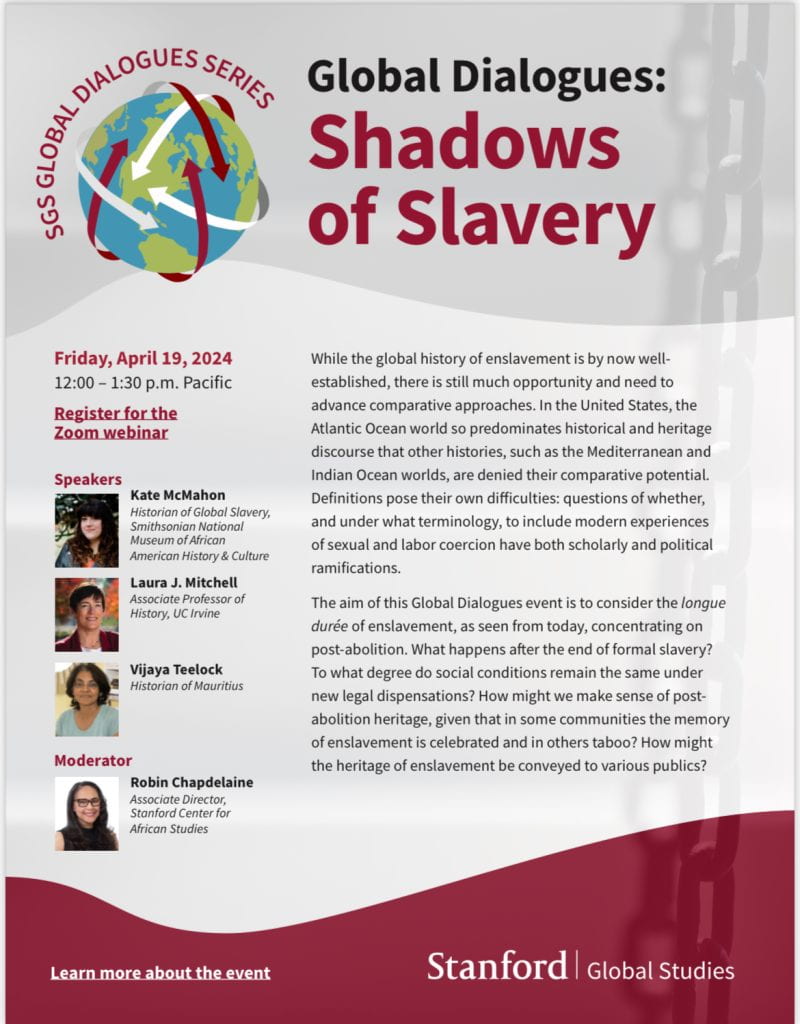Join the CSSC in virtually attending the Zoom webinar Global Dialogues: Shadows of Slavery hosted by Stanford Global Studies in their Global Dialogues series! See the flyer below for more details. Register using the link provided.
Date: Friday, April 19, 2024
Time: 12:00 p.m. – 1:30 p.m.
Register for Global Dialogues: Shadows of Slavery

Join the CSSC for a Brown Bag Lunch Conversation on “Remembering Slavery in Charleston” with Dr. Vanessa Holden! Bring your own lunch and have a conversation about how slavery is remembered in Charleston. Dessert and drinks provided! See further details in the flyer below.
Date/Time: Wednesday March 13th, 2024 at 11 AM
Location: Addlestone Library, Room 227

The Center for the Study of Slavery in Charleston presents a fascinating lecture by Dr. Vanessa Holden – “Surviving Southampton: A Generational Story of Resistance and Rebellion.”
Time: Tuesday, March 12th at 5pm
Location: Alumni Hall in Randolph Hall, Second Floor
See further details in the flyer below!

An interesting upcoming event at the Charleston Library Society based on an astounding document reflecting the intellectual life of Charleston’s antebellum free black community. Join us in hearing from Dr. Bernie Powers and Professor Angela Ray, of Northwestern University, on Thursday, October 26, from 6:00PM to 7:00PM, for an historical perspective on this profoundly important discovery.
Event Location (In-person):
Charleston Library Society
164 King Street
Charleston, SC 29401 U
Tickets: CLS Members $10/ Non-members $15
Bernard Powers, Director, reports on this significant research discovery:
The Center for the Study of Slavery in Charleston fosters a deeper public understanding of slavery and its complex legacies. It supports academic research and teaching that examine the role of slavery in the history of the College and our region. Unfortunately, in Charleston and in many other cities, much of slavery’s past imprint today is shadowy, obscured or completely invisible to our contemporaries. In addition to studying the institution at large, at the Center, our plans include identifying many of the locations that previously comprised Charleston’s downtown slave trading district. These sites will be marked where possible with physical signage, and they will be cohesively catalogued for presentation including on digital platforms for virtual access. It will take considerable energy and time to accomplish this purpose; however, we are certain that meticulous and diligent research can locate the vestiges of this aspect of the once all-pervasive “peculiar institution” and its impact. Just recently our good efforts were advanced through the research of Lauren Davila, a graduate student in the College of Charleston’s master’s degree program and an intern at the Center. While investigating domestic slave trade advertisements in the local newspapers, she came across one that changed the historical record of this commerce in human beings as we understood it until now. The ad she found, announcing without fanfare the sale of six hundred human beings, is in the lower left-hand corner of the image below.

Ad fron Feb. 24, 1835
Lauren’s work came to the attention of Jennifer Berry Hawes, an award-winning journalist for ProPublica with a special knack for exploring the interstices of southern history; Jennifer expanded Lauren’s findings. To read about the remarkable work they have done see the ProPublica article, “How a Grad Student Discovered the Largest Known Slave Auction in the US,” which has also been republished in the Post and Courier.

Lauren Davila near the site of the auction she discovered.
Join us for Dr. Mari Crabtree’s sabbatical presentation on Black Studies and the Ethics of Historical Privacy: When Archival Silences Are Acts of Refusal
Thursday, March 23
5:00–6:00 pm
Addlestone Library 227


The Center for the Study of Slavery in Charleston invites students, faculty, staff, and members of the community to attend a public conversation about repatriation of artifacts, archives, race, and justice. The conversation will feature the story of Tamara Lanier, whose fight against Harvard University for images of her enslaved ancestors Renty and Delia has been covered by numerous national and international media outlets including the New York Times, Boston Globe, Guardian, and Democracy Now! The event is free and open to the public.
Tamara Lanier gives voice to her enslaved ancestors whose naked or partially clothed photographs were forcibly taken in 1850 outside Columbia, SC for a Harvard scientist, Louis Agassiz, who supported racist theories of polygenesis. Lanier’s case foregrounds the need for legislation that protects the cultural property of descendants of chattel slavery in the United States. All are invited to witness Lanier’s inspiring story about the importance of her family’s history and its relevance to national discussions about slavery and reconciliation.
Tuesday, March 21 5:30-7:00 PM
Septima Clark Memorial Auditorium (ECTR 118)
Join us Friday, March 3, 2023 at 4:30pm for a presentation by distinguished historian, educator, and author, Dr. Bernard Powers at Ernest F. Hollings Special Collections Library in Columbia, SC.

This event is free and requires advanced registration.
Sign up here
Check out this great opportunity to learn about American portraiture made during slavery at the Smithsonian National Portrait Gallery’s event

Tuesday, January 31, 5:00–6:00 p.m.
Online via Zoom
“This conversation with Drs. Adrienne L. Childs, John Stauffer, and Jennifer Van Horn will explore the approaches to portraiture made during slavery and in relation to slavery and race. Discover how the use of photography, prints, material culture, and painting varied according to sectional differences in the United States as well as across the Atlantic.
Moderated by Portrait Gallery Historian Kate Clarke Lemay, this program is part of the Greenberg Steinhauser Forum in American Portraiture.”
Join the conversation and sign up for free here!




